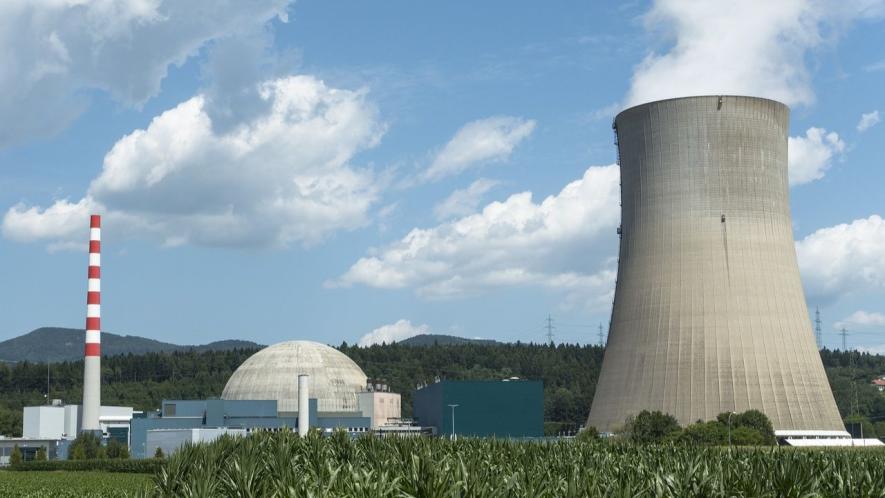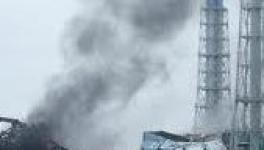Dilution of Atomic Energy Act Will Hurt National Interest: EAS Sarma

Representational Image. Image Courtesy: Needpix.com
New Delhi: EAS Sarma, former Secretary to the Government of India, has reiterated his appeal to Prime Minister Narendra Modi to not yield to pressure by the US and other nuclear supplier countries to dilute India’s Atomic Energy Act and Civil Liability for Nuclear Damage Act, 2010, as indicated by the Finance Minister in this year’s Budget speech.
In his second open letter on the issue to the Prime Minister (the first was written in February this year), Sarma appealed to the Centre to strengthen the two Acts instead for greater self-reliance.
“It is a matter of great concern that India, in its quest for launching a massive expansion of nuclear energy facilities, is now planning to expand its dependence on imported nuclear reactors on a very large scale. The model that the DAE has adopted comprises individual nuclear power complexes consisting of 6 reactors, each reactor of capacity exceeding 1000 MWe. If such large nuclear power clusters having 6 reactors at each location were to operate in an environment in which the country’s nuclear regulator is not independent enough to enforce the state-of-the-art safety protocols, it could expose the people to significantly high risks from accidents likely to occur,” he wrote.
Read the full letter below:
To
Shri Narendra D Modi
Prime Minister
Dear Shri Modiji,I invite your attention to my letter of 9th February 2025 appealing to you not to yield to the pressure exerted by nuclear supplier countries like the USA to dilute the Atomic Energy Act and the Civil Liability for Nuclear Damage Act, 2010, as indicated by the Finance Minister in her Budget Speech this year It understand that the Department of Atomic Energy (DAE)
has “constituted committees with members from the Department of Atomic Energy, the Atomic Energy Regulatory Board, NITI Aayog and the Ministry of Law and Justice to discuss amendments to the Atomic Energy Act and the Civil Liability for Nuclear Damage Act (CLNDA) to allow private companies to participate in building and commissioning future nuclear reactors”(https://www.thehindu.com/news/national/committees-constituted-to-amend-nuclear-liability-laws/article69404712.ece)
Evidently, several nuclear supplier countries like the USA are pressurising India to buy their nuclear reactors and, in order to insulate them for the liability that may arise from nuclear accidents in the future, they are demanding that CLNDA should be diluted so as to shift the burden of liability to the Nuclear Power Development Corporation of IndiaLtd. (NPCIL) and ultimately to the Indian taxpayer.
I am not sure whether the US had raised this issue recently during the discussion that you with the US President (https://www.thehindu.com/news/national/government-plans-to-amend-nuclear-liability-law-in-spotlight-as-modi-heads-to-us-france-this-week/article69198583.ece)
As I had earlier pointed out to you, the CLNDA, as enacted by the Parliament when the UPA was in power, is a diluted version of the kind of CLNDA proposed by the Parliamentary Standing Committee at that time keeping in view the need to ensure the safety of operation of imported nuclear reactors.
For example,
The Committee at that time felt that the operator’s (NPCIL’s) right of recourse against suppliers was somewhat vague and open-ended. The Committee therefore recommended that recourse against the supplier should be strengthened. The supplier should be held liable if an incident has occurred due to (i) defects in the design of the reactor, or (ii) sub-standard materials used in the reactor, or (iii) gross negligence on the part of the reactor manufacturer in ensuring the required quality of the material, equipment or services provided for operating the reactor. The committee therefore recommended strengthening Clause 17 of the Bill.
Unfortunately, the UPA government at that time came under pressure from overseas reactor suppliers and their respective parent governments to dilute the relevant clause so as to limit the suppliers’ liability severely, literally amounting to insulating them more or less fully, against any liability attributable to defects in the equipment, the use of sub-standard material and
gross negligence of the supplier of the material, equipment or services. Such negligence is commonplace in nuclear reactor business. The members of the Parliamentary Committee were anxious that the proposed law should reflect Indian interests and well-being, and that “there should be a clear-cut liability on the supplier of nuclear equipment/material in case they are found to be defective” The Committee felt that
Clause 17(b) of the Bill in its proposed version gave an escape route to the suppliers of nuclear materials, equipment, services of his employees as their wilful act or gross negligence would be difficult to establish in a civil nuclear compensation case. The intention was to ensure that compensation would not be inadequate for victims of a nuclear accident, nor would it be inadequate to cover the cost of clean-up of the accident site.
Ironically, at that time, it was the BJP that rightly acted firm in Parliament to push through the amendment recommended by the Parliamentary Standing Committee (http://timesofindia.indiatimes.com/articleshow/6421684.cms?utm_source=contentofinterest&utm_medium=text&utm_campaign=cppst)
The report cited above read as follows:
“Minister of State in the PMO Prithviraj Chavan met Leader of Opposition in Rajya Sabha Arun Jaitley to discuss the issue over which the BJP and Left parties are angry and are threatening to oppose the bill when it is taken up for consideration in Parliament later this week. After the meeting, Jaitley said he had told Chavan that BJP wanted restoration of language in Clause 17(B) suggested by the Parliamentary Standing Committee that examined the bill and then his party would think about its support.The opposition parties are crying foul after the Union Cabinet on Friday last cleared 18 amendments, including the one which deals with a clause on liability of a supplier in the event of a nuclear accident“
As pointed out to you earlier, there is justification for the fears expressed by BJP at that time, as explained below:
1. The use of substandard material and flaws in monitoring the manufacture of nuclear reactors are not uncommon in the global nuclear industry as evident from reports available from the portals of the UK and French nuclear regulatory authorities and other reports (https://www.french-nuclear-safety.fr/information/news-archives/flamanville-epr-reactor-asn-inspection-on-10th-april-2018 & https://www.onr.org.uk/publications/corporate-publications/foi-releases/2022/01/potential-generic-fault-in-the-design-of-the-reactor-pressure-vessel-rpv-epr-nuclear-reactor/)
2. The Fukushima nuclear disaster that occurred in 2011 has clearly established the mind-boggling cost of cleaning up a disaster-affected reactor site (https://asia.nikkei.com/Spotlight/Fukushima-Anniversary/Fukushima-cleanup-costs-swell-with-no-end-in-sight). Japan has spent roughly 1 trillion yen ($7.3 billion) annually on addressing the damage caused by the meltdowns at the Fukushima Daiichi nuclear power plant that occurred 12 years ago, and the final price tag is still uncertain. Considering that the capacity of each imported reactor complex that India is planning to set up will be higher than that of Fukushima complex, the cost of a Fukushima-like accident, if it were to occur in India, would be so huge that it would be difficult for the Union Budget to absorb it.
3. The Atomic Energy Regulatory Board (AERB) in India functions under the administrative control of the Department of Atomic Energy (DAE) whose facilities it is expected to regulate. Post-Fukushima, yielding to public pressure, the DAE introduced a Bill in 2012 to institute an independent regulatory authority, which the concerned Parliamentary Standing Committee examined and, on which, it made several far-reaching recommendations to strengthen it. The DAE is yet to follow up on those recommendations till date.
It is a matter of great concern that India, in its quest for launching a massive expansion of nuclear energy facilities, is now planning to expand its dependence on imported nuclear reactors on a very large scale. The model that the DAE has adopted comprises individual nuclear power complexes consisting of 6 reactors, each reactor of capacity exceeding 1000 MWe. If such large nuclear power clusters having 6 reactors at each location were to operate in an environment in which the country’s nuclear regulator is not independent enough to enforce the state-of-the-art safety protocols, it could expose the people to significantly high risks from accidents likely to occur.
Such concerns are further accentuated by an already diluted
Civil Liability for Nuclear Damage Act, which incentivises reactor manufacturers to cut corners in ensuring that the reactors supplied by them comply with the highest standards of safety.
In my view, instead of further amending the Atomic Energy Act and the Civil Liability for Nuclear Damage Act to dilute their provisions to accommodate the nuclear manufacturers, there is a case for strengthening those legislations to make sure that imported nuclear reactors do not pose a threat to public safety and that reactor suppliers are held fully accountable for any liability that may arise from accidents directly/indirectly attributable to their shortcomings.
I would appeal to the DAE, NITI Ayog and the Ministry of Law to consider the recommendations made by the Parliamentary Standing Committee referred above for strengthening the Civil Liability for Nuclear Damage Act vis-a-vis the Bill proposed by the UPA government at that time, so that the legislation may be suitably strengthened to hold reactor suppliers fully accountable for the safety of their reactors and the safety of the people.
I would take this opportunity to suggest to the Government to revisit the idea of India enlarging its dependence on imported reactors and imported fuel, as it could adversely impact the long-term vision of Dr Homi J Bhabha to make India self-reliant in the field of nuclear power development. I would invite the attention of the Government to an article in which I had explained my concerns on this, which can be accessed at https://peoplesdemocracy.in/2017/0219_pd/nuclear-energy-india-self-reliance-import-dependence
Regards,
Yours sincerely,
E A S Sarma
Former Secretary to the Government of India
Visakhapatnam.
Courtesy: Countercurrents.org
Get the latest reports & analysis with people's perspective on Protests, movements & deep analytical videos, discussions of the current affairs in your Telegram app. Subscribe to NewsClick's Telegram channel & get Real-Time updates on stories, as they get published on our website.
























